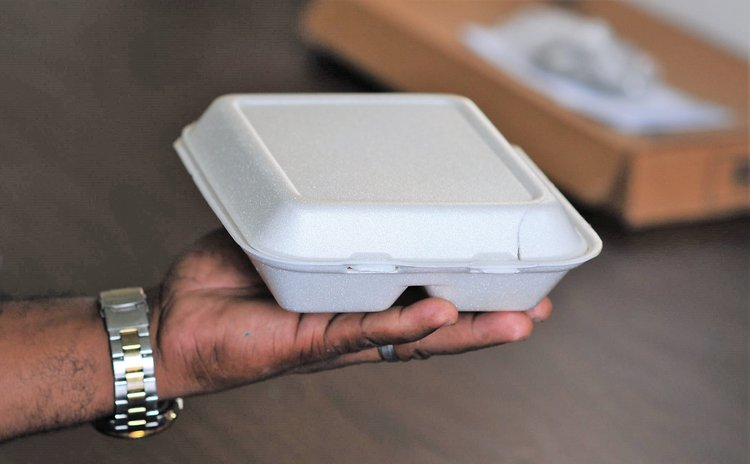Yes, ban plastic food containers but what about the cost?

Government has decided that beginning January 1st 2019 there will be bans on plastic straws, plastic plates, plastic forks, plastic knives, Styrofoam cups and Styrofoam containers. Prime Minister Roosevelt Skerrit made the announcement during his budget address last July.
As you may have observed these items are used frequently by almost everyone from roadside vendors to large restaurants to present take-away food to their customers. So, what are these food businesses going to do when the ban takes effect?
Owners of restaurants who spoke to the Sun last week say that while they welcome government's move in the interest of protecting the environment from plastic pollution, the cost of biodegradable food utensils is much more than the ubiquitous plastic or Styrofoam products.
"We cannot absorb that cost so it means that we will have to increase of the prices of our food in order that we make something," said a restaurant owner who did not want to be identified.
"We cannot survive if we have to purchase (non-plastic utensils) and while we agree with the government, they need to ensure that we also can make a living and try to get the cost down or we will have no choice but to increase the prices of our food," another food seller said.
A check online indicated the potential price differences of plastic and biodegradable food containers. For example a 50-pack biodegradable 6x9 containers costs about US$29.99 which works out to be about EC$2.00 per container. On the other hand, the to-be-banned Styrofoam containers cost US$36.50 for a case of 500 containers i.e. about 20 Eastern Caribbean cents per container.
So, what are the alternatives to plastic utensils? Here are some ways the worldwide industry is attacking the problem.
•Plant-based plastics: Bioplastics are made from a variety of sources such as corn.
•Mushroom root: With Mycelium packaging is literally grown.
•Bagasse: Bagasse is a by-product of sugarcane processing. Due to its malleability and stickiness, it can be easily moulded into packaging suitable for food delivery and food service – similar to polystyrene.
•Seaweed water bubbles: UK startup Ooho have created an edible (and by default, biodegradable) water bubble made of seaweed.
•Shower-friendly paper
•Stone paper and plastic: It might surprise you to know that paper can be made out of stone.
•Palm leaves: Holy Lama use palm leaves from the areca palm to create the oyster-like cases for their handmade soaps.
•Cornstarch and sorghum loose fill is made from corn starch and can be used the same way as regular polystyrene loose fill.
•Wood pulp cellophane.
•Prawn shell plastic bags: Scientists around the world are developing plastic alternatives out of the most unlikely things but the material has the potential to replace plastic in packaging for food and drinks.
•Milk plastic: Casein – the protein found in milk – has been used to make plastic for over a century.




